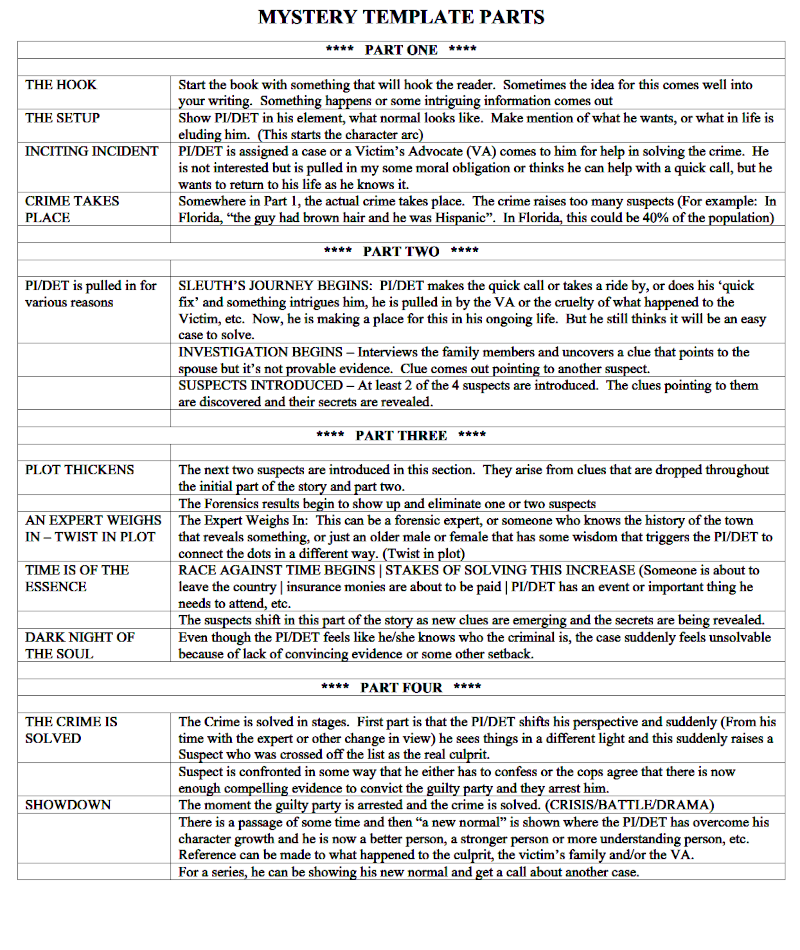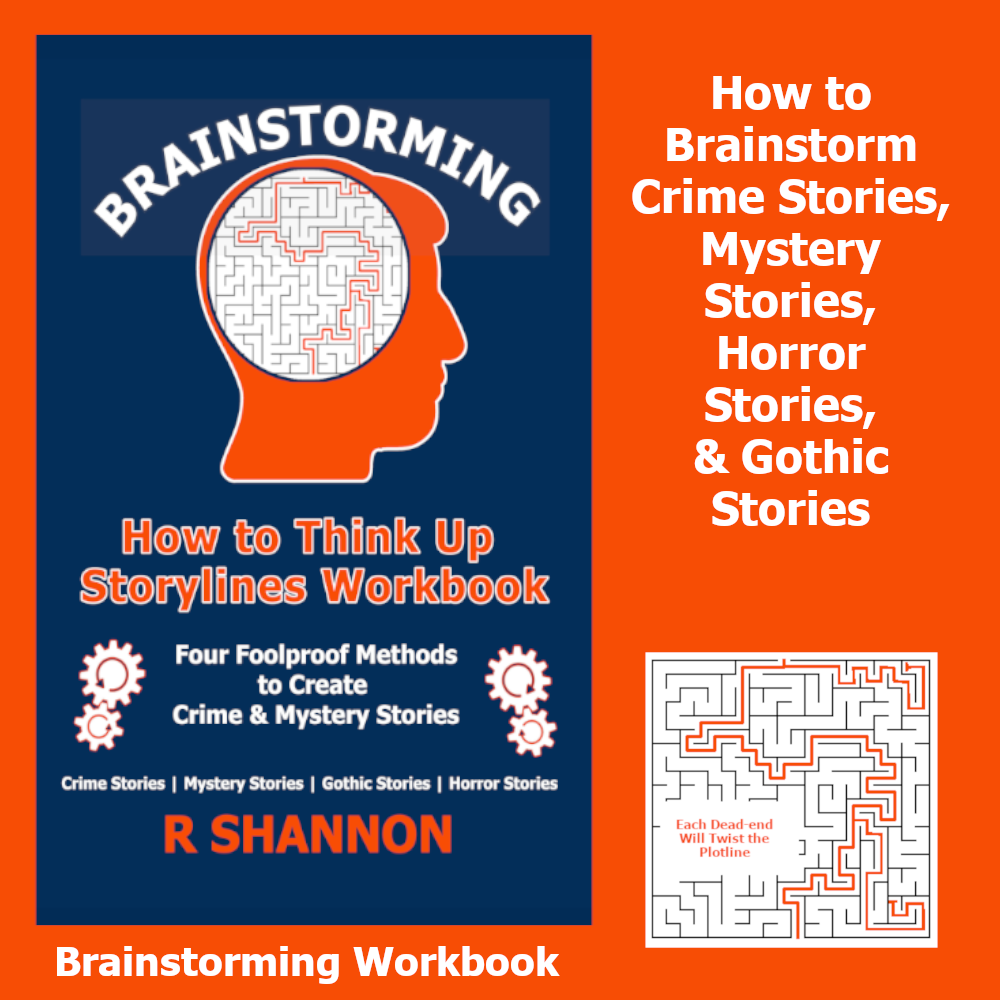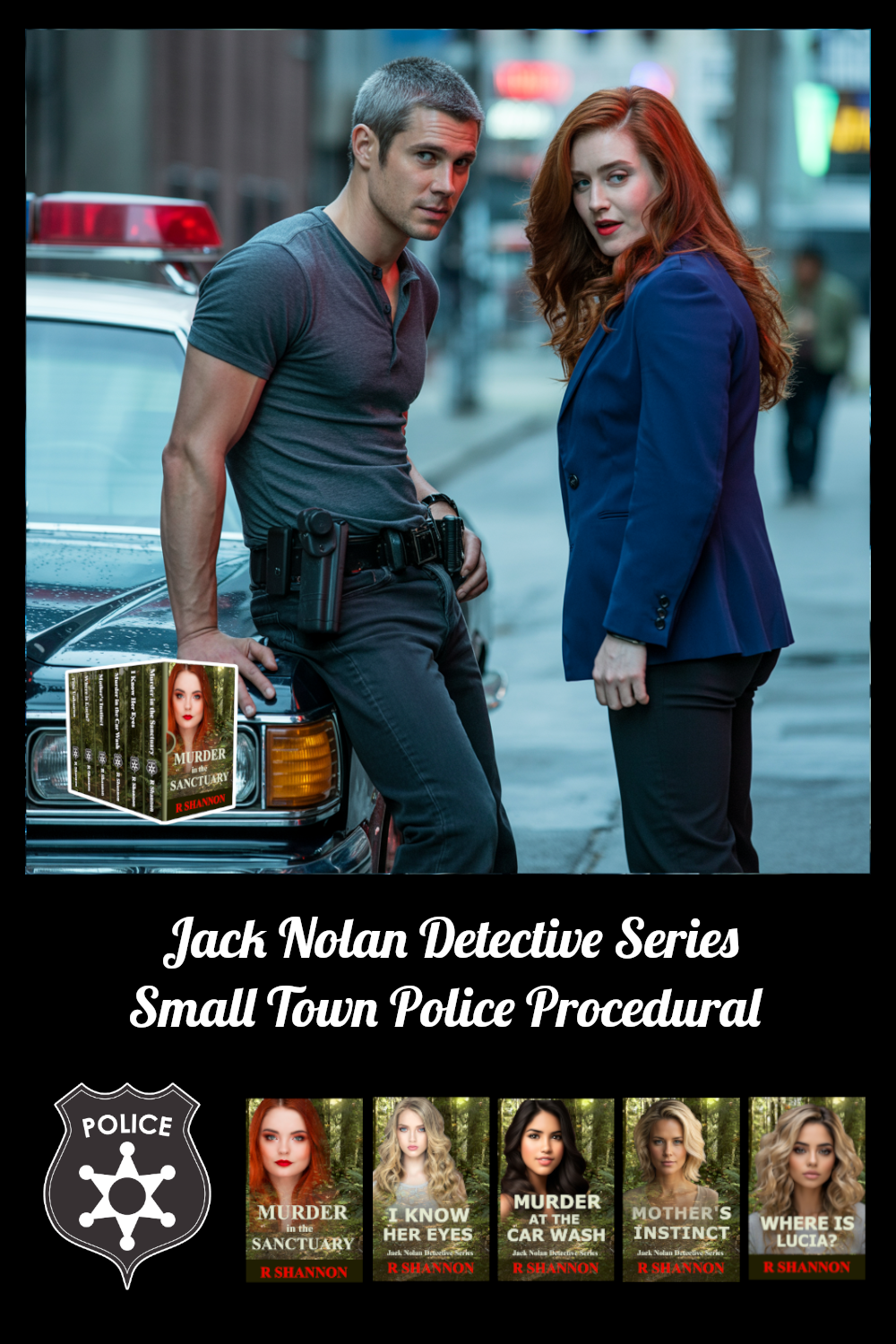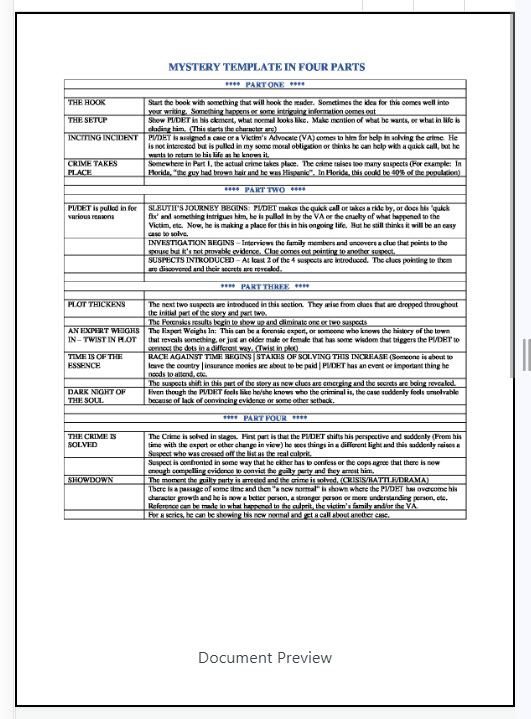 In my humble opinion, writing mysteries requires a bit more planning than a novel about other subjects. You have to manage character arcs, crime arcs, clue dropping, red herrings, passage of time, as well as add pressure and suspense into the mix. This is a lot for a new writer.
In my humble opinion, writing mysteries requires a bit more planning than a novel about other subjects. You have to manage character arcs, crime arcs, clue dropping, red herrings, passage of time, as well as add pressure and suspense into the mix. This is a lot for a new writer.
I found this overwhelming as I began writing back in 2018. The two biggest tips I can pass on at this point are (1) write in Scrivener as you get a bird's eye view of your project all all times and (2) you need a template or an outline of some kind to work from.
WHAT I WISH I HAD WHEN I WAS NEW:
The main reason I've started this Writer's Diary is because I had searched and searched for writer's diaries online and never found anyone who was sharing their whole novel experience. That's why I am doing this. This is another one of the things I wish I had when I was new. I still consider myself new, by the way.
MY OUTLINES WERE TOO FLEXIBLE:
 In my first few novels, I would start off with a loosely-planned outline in order to give the characters space to organically develop. I had noticed within the first novel that the characters did develop their own voice and personalities. I thought this open template would give me the leeway to let the novel sort of write itself. It didn't.
In my first few novels, I would start off with a loosely-planned outline in order to give the characters space to organically develop. I had noticed within the first novel that the characters did develop their own voice and personalities. I thought this open template would give me the leeway to let the novel sort of write itself. It didn't.
In hindsight, I was too open-ended about how the story would end. The characters would take on their own voice at some point in the story but because I had this loose outline, somewhere in Part 2 or Part 3, the story would start to veer off course. As I got to Part 3, I would notice I was too far away from the ending of the story that I had planned originally. But I wouldn't have any great ideas for a better ending either. I would even forget what the original concept for an ending was. Or I would look back and realize the story had veered too far away from a logical ending of the story or solving of the crime/mystery and I would need to go back and start rewriting.
I NEED A WRITING DESTINATION:
What I found by about the sixth novel was that I can leave the beginning and middle of the outline very loose, but I need to know where I am ending the story. I need to know how the crime will be solved, who the bad guy is, and how the clues will be dropped in order to manage the suspects, the red herrings and the suspense.
So I still keep my outline loose in the beginning sections but I make sure I know where I am heading, what corner I need to lead the bad guy into in order to wrap up the story. This gives me more security while I'm writing. It also helps me stay on course.
REMAIN OPEN-MINDED BUT CHANGE THE OUTLINE:
 There have been times when a better story did strike me during the writing process. I can go with the new direction, but I must alter my outline so that the new ending is the new destination. I rewrite my outline of how it will end so I will have the self-confidence that I still know where I'm going.
There have been times when a better story did strike me during the writing process. I can go with the new direction, but I must alter my outline so that the new ending is the new destination. I rewrite my outline of how it will end so I will have the self-confidence that I still know where I'm going.
This is a much more workable way to remain flexible but still have the boundaries and guard rails I need to write tight scenes and know where I am in the story.
START BY PICKING A PROTAGONIST OR A CRIME:
I start by picking a crime. My inspiration can be from a novel I'm reading, or a news article, an episode of Forensic Files, or sometimes they can be a combination of all of these. I am beginning to think more like an author and am starting to envision crimes happening in strange places or interesting environments.

PICK YOUR PROTAGONIST/HERO:
The most popular choices for heros/mystery solvers are police officers/detectives, private investigators, and amateur sleuths. I chose a private investigator as my first protagonist as PIs are easier to write about because police procedure is very complicated these days and that would have been too much to take on as a new writer.
I pick a Protagonist/Hero based on a personality type I think I can write convincingly about. If you are planning a series, you will want to give your Hero at least a few people that are anchors in his life. This will also give you leeway if you need to come up with a second novel as the stories can come through people in his/her life as well as from working.
I will reveal my Template - Planning Your Mystery in our next writers diary installment and how I start organizing my mystery elements.




 I am a diligent plotter and planner when I write. Starting in Scrivener, I construct the story and go over it from six or seven different angles before I even compile it to be worked on, massaged and proofread in Microsoft Word.
I am a diligent plotter and planner when I write. Starting in Scrivener, I construct the story and go over it from six or seven different angles before I even compile it to be worked on, massaged and proofread in Microsoft Word. In my humble opinion, writing mysteries requires a bit more planning than a novel about other subjects. You have to manage character arcs, crime arcs, clue dropping, red herrings, passage of time, as well as add pressure and suspense into the mix. This is a lot for a new writer.
In my humble opinion, writing mysteries requires a bit more planning than a novel about other subjects. You have to manage character arcs, crime arcs, clue dropping, red herrings, passage of time, as well as add pressure and suspense into the mix. This is a lot for a new writer. In my first few novels, I would start off with a loosely-planned outline in order to give the characters space to organically develop. I had noticed within the first novel that the characters did develop their own voice and personalities. I thought this open template would give me the leeway to let the novel sort of write itself. It didn't.
In my first few novels, I would start off with a loosely-planned outline in order to give the characters space to organically develop. I had noticed within the first novel that the characters did develop their own voice and personalities. I thought this open template would give me the leeway to let the novel sort of write itself. It didn't. There have been times when a better story did strike me during the writing process. I can go with the new direction, but I must alter my outline so that the new ending is the new destination. I rewrite my outline of how it will end so I will have the self-confidence that I still know where I'm going.
There have been times when a better story did strike me during the writing process. I can go with the new direction, but I must alter my outline so that the new ending is the new destination. I rewrite my outline of how it will end so I will have the self-confidence that I still know where I'm going.
